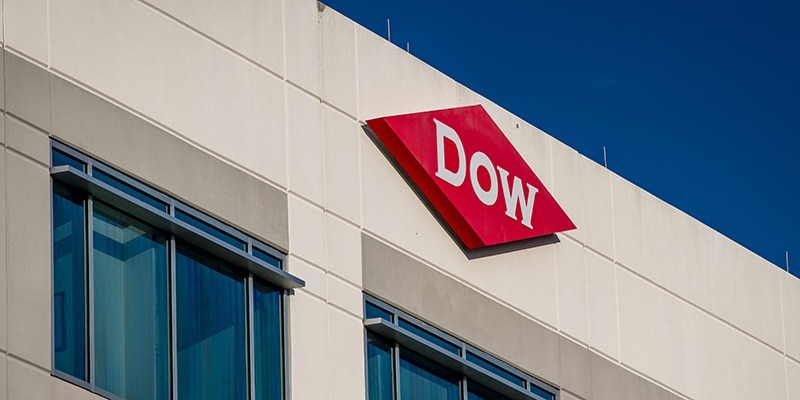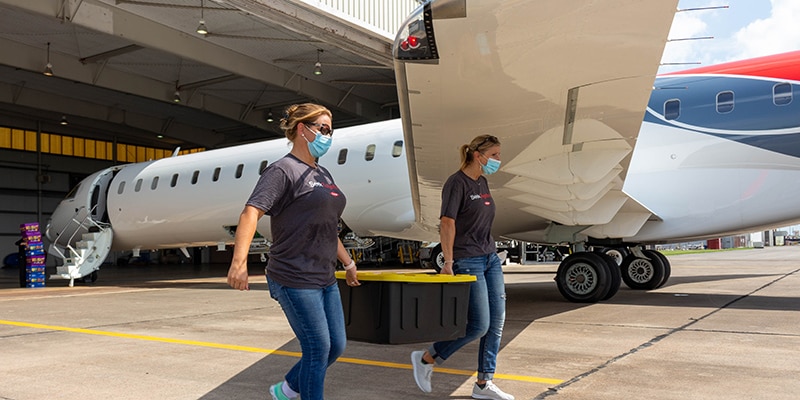Michigan has been home to Dow since its founding in 1897. While our products, businesses and operations have evolved over the course of the past century, our commitment to our employees and our communities has remained the same. The Great Lakes Bay Region continues to evolve as a hub for corporate leadership, research and development, and manufacturing.

Dow in Michigan
About Us
A Place of Great Beginnings
Michigan Operations (MiOps) is a place of great historical significance to Dow. The site originated in the 1890’s after Herbert Henry Dow moved to Midland, Michigan, from the Cleveland, Ohio, area to take advantage of the prehistoric brine deposits under the Saginaw Valley. His plan was to use his innovative process for extracting chemicals from the brine by electrolysis, and manufacture bleach on a commercial scale.
H.H. Dow accomplished this and more. By 1918, Dow had shifted focus to the production of calcium chloride, magnesium metals and acetyl salicylic acid – better known as aspirin – which was made at MiOps for more than 70 years. H.H. Dow continued to churn out new innovations, diversify his portfolio, and expand his company until his death in 1930. Michigan Operations served as Dow’s global headquarters until the late 1960’s when the corporate center was built to house businesses, functions, and the Office of the Chief Executive.
Michigan Operations Today
The Dow Michigan Operations Industrial Park (I-Park) represents the future of innovation in the Great Lakes Bay Region. It serves as a hub of technology, growth, partnership, and manufacturing excellence.
The I-Park ushers in a new era of collaboration for Dow and the other tenant companies on site. Working collectively, these companies are focused on safe operations, employee excellence and talent development, production efficiencies, and a commitment to the region.
Visitor access to the I-Park is by way of an Alden Dow-inspired entrance on South Saginaw Road. This is the gateway to the 2,600-acre site and a work home to about 6,000 employees and contractors.
I-Park Tenants include:
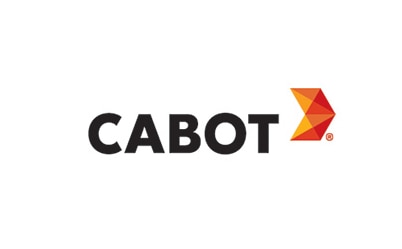
Cabot Corporation
A leading global specialty chemicals and performance materials company serving key industries such as transportation, infrastructure, environment and consumer.
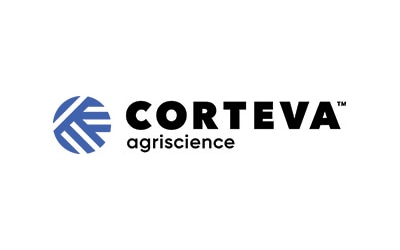
Corteva Agriscience
Offering a comprehensive and diverse portfolio of advanced agricultural products, including seed products, based on elite germplasm and crop protection products for insect, cereal weed, broadleaf and grass, and disease control.
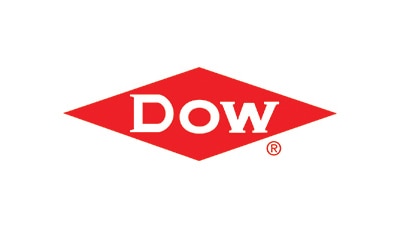
Dow, Inc.
Superior solutions for high growth markets in Packaging & Specialty Plastics, Industrial Intermediates & Infrastructure, and Performance Materials & Coatings, built on the strongest and deepest chemistry and polymers toolkits in the industry.
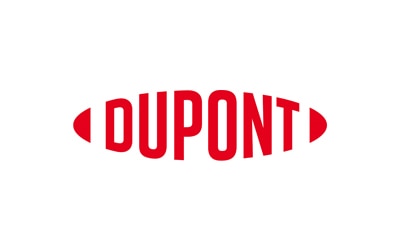
DuPont Specialty Products
High performance materials and technologies for the Electronics & Imaging, Transportation & Advanced Polymers, Safety & Construction and Nutrition & Biosciences industries.
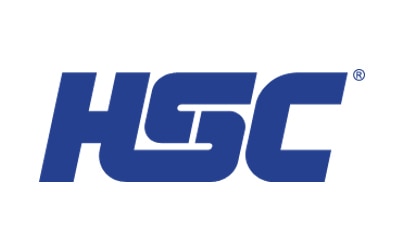
Hemlock Semiconductor
HSC manufactures hyper-pure polysilicon, supplying two high-tech industries: electronics and solar panels. As the raw material used to create semiconductors, polysilicon is crucial for cell phones and computers, as well as other technologies.
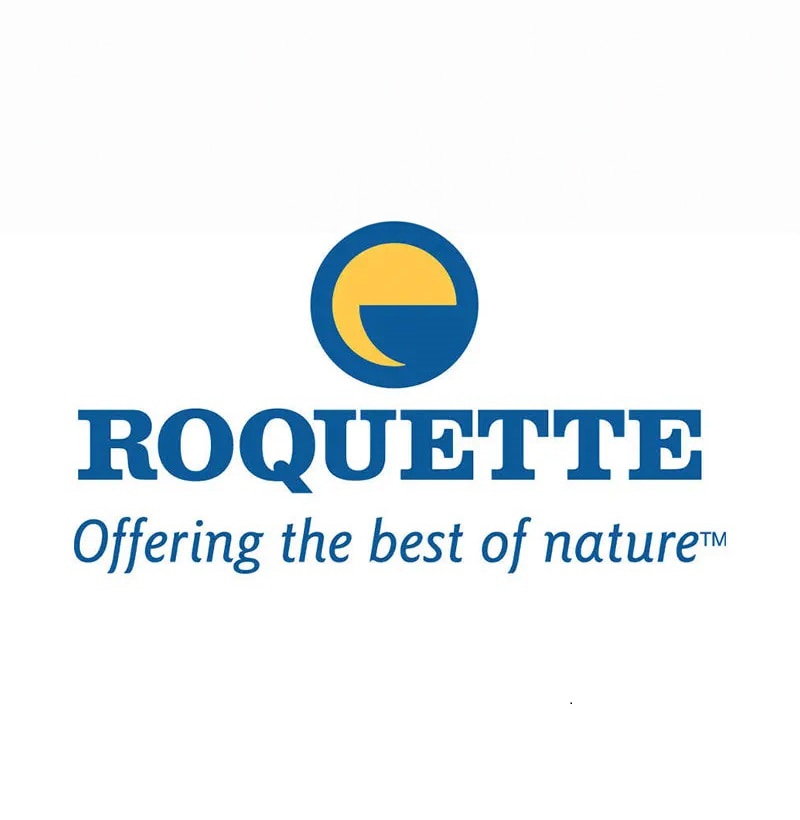
Roquette
Roquette is a global leader in plant-based ingredients and a leading provider of pharmaceutical excipients. In collaboration with its customers and partners, the group addresses current and future societal challenges by unlocking the potential of nature to offer the best ingredients for food, nutrition and health markets.
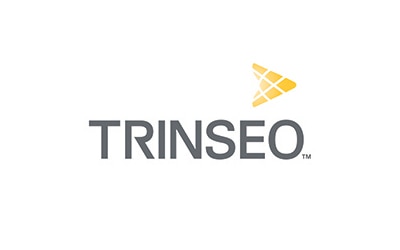
Trinseo
Global solutions for today’s manufacturers, including polycarbonate compounds and blends, latex binders, synthetic rubber and styrenics, based on the combined technologies and capabilities of four Dow businesses.
Locations
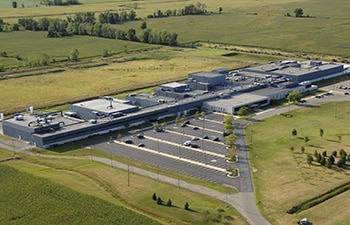
Auburn Operations
Auburn Operations’ primary design is to house research and development alongside manufacturing to quickly develop and commercialize high valued products for use in challenging and leading edge applications.
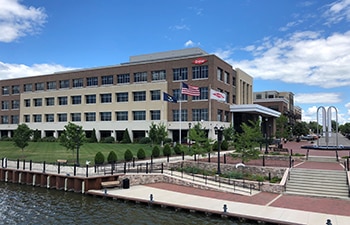
Bay City Uptown
Dow's 100,000 square-foot, five-floor corporate office building in Bay City is designed to create easier collaboration and additional efficiencies for employees. The Uptown waterfront development is about 15 miles from Midland and is a dynamic, walkable, and vibrant planned neighborhood featuring diverse restaurants, unique retail shops, and businesses.
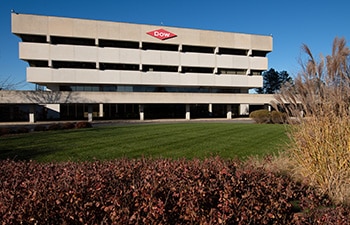
Dow Central Campus
Dow's corporate facilities and grounds in Auburn is called Dow Central Campus (DCC) – acknowledging its central location within the Great Lakes Bay Region. Dow Central Campus produces a unique product mix and is an important research and development center.
Corporate Center
Dow's Corporate Center serves as the global headquarters for the 189 sites and 37,800 employees worldwide. The campus sits on 150 acres and has nearly one million square feet of building space among its three buildings.
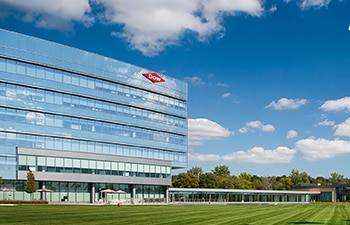
The Global Dow Center is home to many Dow businesses and functions, as well as the Office of the Chief Executive. The facility within the Corporate Center Campus includes a visitor reception area. The new facility design employs an open concept to encourage a collaborative environment.
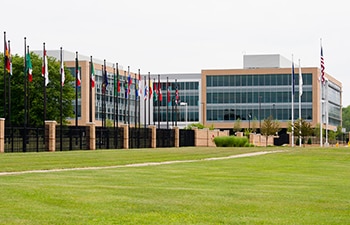
The Ben Branch Center is home to Dow’s Business Process Services Center and Customer Service department. Charles “Ben” Branch served as Dow’s president and CEO from 1971-1976, a period of tremendous growth and expansion for Dow.
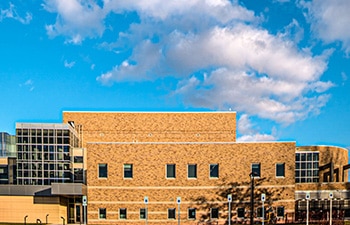
The Sylvia Stoesser Center is a 93,000 square-foot facility that houses 350 employees, and the Dow Wellness Center. The facility was named after Sylvia Stoesser, the first woman chemist hired by Dow.
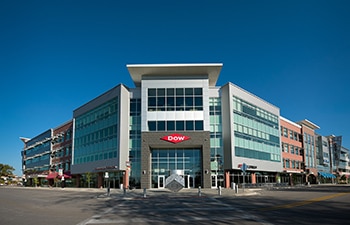
East End
The East End facility in downtown Midland provides Dow's world-class employees with a premier work environment. Packed with innovation-centric features and the latest in technology, it accentuates Dow's focus on the future and has the flexibility to accommodate future growth.
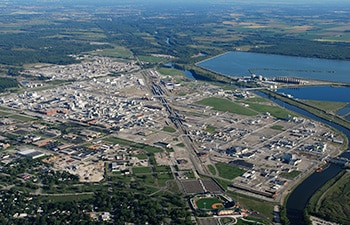
Michigan Operations
Michigan Operations focuses on specialty silicones manufacturing and houses one of the company’s largest research and development campuses that provides innovative solutions and technical support to Dow businesses around the world.
Community Engagement
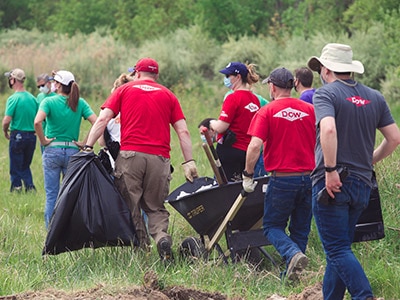 In the Great Lakes Bay Region, Dow looks to invest in programs and organizations that will have lasting impact and serve as a starting point for community growth. We use our product and technology solutions, along with traditional philanthropic giving, to address some of the region’s most pressing needs. Employees in the region volunteer thousands of hours annually to charitable organizations with a focus on sustainability, STEM and community well-being. We are committed to working alongside our community partners to identify and implement long-term solutions to community challenges.
In the Great Lakes Bay Region, Dow looks to invest in programs and organizations that will have lasting impact and serve as a starting point for community growth. We use our product and technology solutions, along with traditional philanthropic giving, to address some of the region’s most pressing needs. Employees in the region volunteer thousands of hours annually to charitable organizations with a focus on sustainability, STEM and community well-being. We are committed to working alongside our community partners to identify and implement long-term solutions to community challenges.
Community Success
Through Pulling Our Weight initiatives, Team Dow raises awareness around responsible waste management. Pulling Our Weight continues to be the largest employee volunteer initiative for a single cause in Dow’s history and demonstrates our commitment to a cleaner environment and better world.
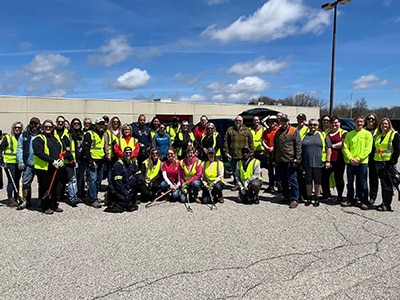 Members of the Dow Great Lakes Bay community – including employees, contractors, family, friends, and customers – come together to collect thousands of pounds of waste in the environment each year in an effort to foster a cleaner community.
Members of the Dow Great Lakes Bay community – including employees, contractors, family, friends, and customers – come together to collect thousands of pounds of waste in the environment each year in an effort to foster a cleaner community.
Another example of Dow colleagues coming together in the Great Lakes Bay Region is through the United Way Campaign. Each fall, Dow sites across the U.S. hold campaigns to raise awareness of issues in our communities and harness collective power to create positive impact. The organization partners with non-profits who help to improve lives in three areas – youth success, household stability and health. In 2022, employees in the region collectively raised over a million dollars and volunteered for countless organizations to better the communities we live and work in.
Community Advisory Panel (CAP)
Dow maintains transparent dialogue with the surrounding community through its Community Advisory Panel (CAP). The CAP consists of area residents who are selected to be reflective of the community and its issues and in alignment with Dow ACTs to ensure diverse representation from across the region. Members come together on a quarterly basis to help shape Dow’s decisions and strategies in brining forth diverse community perspectives, questions, comments, and concerns. It is also intended to increase community members’ understanding of Dow’s operations and commitment to community success.
DowGives
The application is now open and will remain open through September 15. Organizations are welcome to apply any time during this period but are encouraged to apply early in the process. There will be three grant review periods.
Our 2026 grant review cycles are:
- Grant Review #1: March 1 – March 31
- Grant Review #2: June 1 – June 30
- Grant Review #3: September 16 – September 30
Any requests received by February 27 will be reviewed during the first grant period. Requests received after February 27 but before May 29, will be reviewed during the second grant period. And requests received May 29 but before September 15, will be reviewed during the third grant period.
If your project or event takes place late in the year or very early next year, please apply in the grant cycle that will allow enough time for review and payment (6-8 weeks).
All grant applicants should apply for a grant using the following new application link.
https://www.cybergrants.com/dow/naasiteopen2026
Links from previous years are no longer valid.
If you have questions or issues with the process, please reach out to globalcontributions@dow.com.
Thank you for your interest in Dow.
Grant Eligibility Requirements
Organizations must meet the following criteria to be eligible for a grant:
- Applicants must be a charitable or non-profit organization with a 501(c)3 designation or eligible government or school with required tax documentation. Note – faith-based organizations may qualify, provided their proposed project is for the benefit of the community as a whole rather than just the members of the congregation
- The organization must reside in the Great Lakes Bay Region and grants must benefit the region
- The organization must be able to demonstrate it is financially stable
- The organization has a defined plan to sustain the long-term viability of the project
- Measures of success are defined in the application to demonstrate project impact in the region; organization agrees to submitting impact data, after one year of project completion
- The project will impact a large number of citizens in the region and will address a regional need
- The amount of funding requested must accurately reflect the amount needed to fund the project
- If additional funding is required to complete the project, the organization will already have the funding sources identified prior to submitting a Dow grant request
Examples of charitable organizations and/or activities that would not qualify for funding include:
- Projects submitted by for-profit businesses, religious organizations for the sole benefit of the organization, individual sports teams (see Community Youth Grants), political organizations for candidates, labor unions, homeowners’ associations or individuals
- Operating expenses, personal computers, travel expenses, conferences, advertising, fundraising events, giveaways or prizes, individual scholarships, dues and memberships, or lobbying expenses
We collaborate with partners who create social impact in our communities. Projects must align to one or more of the Dow Global Citizenship priority areas, Inclusion, Diversity & Equity, Thriving Communities, STEM & Skilled Trades and Sustainability.
Learn more about Dow's Global Citizenship program in the community section our Dow Corporate Environmental, Social and Governance (ESG) Report and see how we're accelerating efforts to create a more sustainable and equitable future.
An organization may apply by completing the CyberGrants on-line application form linked above. Representatives from Dow will review all applications received and will contact organizations, after the giving cycle closes, to notify if the request for funding was approved or declined. Please note, Dow would like to be able to assist all grant requests that meet its established criteria; however, each year it must decline many requests for the simple reason that its funds are limited. Consequently, an applicant should never view a determination to decline as a judgment on the merits of the proposal.
Youth Grants
K-12 Youth Group Grants
Grants of up to $1,000 are available to K-12 youth groups in the Great Lakes Bay Region who complete 50 collective hours of volunteer service and are affiliated with a non-profit organization or public/private school. These grants are administered by local foundations, based on funds available.
To apply, contact your local area community foundation:
Midland Area Community Foundation
Contact: Nicole Wilson
Email: nwilson@midlandfoundation.org
Phone: 989-839-9661, ext. 34
Website: www.midlandfoundation.org
Bay Area Community Foundation
Contact: Lisa Bourdon-Krause
Email: lkrause@bayfoundation.org
Phone: 989-893-4438
Website: www.bayfoundation.org
Saginaw Community Foundation
Contact: Brian Jackson
Email: brian@saginawfoundation.org
Phone: 989-755-0545
Website: www.saginawfoundation.org
Sponsorships
Sponsorships are available to non-profit organizations for fundraising or community events within the Great Lakes Bay Region that align to the priority areas listed above.
An organization may apply by completing the CyberGrants on-line application form. Representatives from Dow will review all applications received and will contact organizations, after the giving cycle closes, to notify if the request for sponsorship was approved or declined. Please note, Dow would like to be able to assist all sponsorship requests that meet its established criteria; however, each year it must decline many requests for the simple reason that its funds are limited. Consequently, an applicant should never view a determination to decline as a judgment on the merits of the proposal.
Sponsorship Eligibility Criteria:
Organizations must meet the following criteria to be eligible for a grant:
- The organization must reside in the Great Lakes Bay Region
- The event is aligned to a strategic financial plan designed to sustain the organization
- The amount requested accurately reflects the amount needed
- The organization must be a charitable or non-profit organization with a 501c(3) designation
Note – faith based organizations may qualify, provided their proposed event is for the benefit of the community as a whole rather than just the members of the congregation
Join our Team
We are constantly looking to bring in fresh thinking to push what’s possible in the Great Lakes Bay Region. From manufacturing, research and development, and a variety of corporate careers, Dow offers a wide range of career paths within specialized areas of expertise.
View open roles in Michigan, including internships, apprenticeships, mid-level and seasoned positions.
News
Follow us on Facebook to stay up to date with timely news and for updates on how our employees are contributing to the success of the Great Lakes Bay Region.



